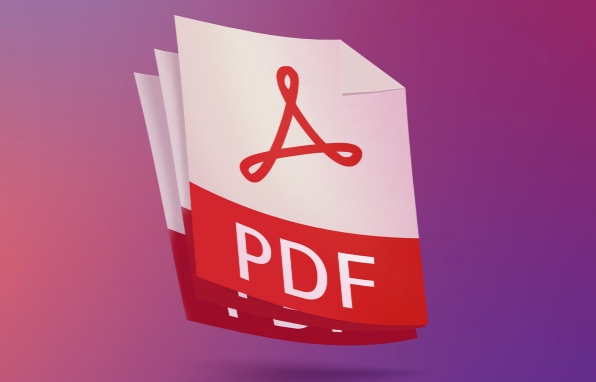Action Wizard is an automation tool in Adobe Acrobat Pro for batch processing of PDFs. It allows users to combine multiple tasks such as merging files, adding watermarks, compression, etc. into one action, and execute them in one click in sequence, saving time. The creation steps include: Open the Action Wizard panel → Create a new action → Naming → Add operation steps → Set parameters → Save. Common uses include batch watermarking, merging and exporting to Word, compressing volume, encrypting documents, extracting pages, etc. When using it, you need to pay attention to the operation sequence that cannot be changed, the action cannot be paused during operation, some functions are incompatible, it is recommended to test first and then batch processing, and the common actions can also be fixed to the home page Quick Access bar to improve efficiency.

Using Action Wizard in Adobe Acrobat Pro is actually not complicated, but many people may find it a bit confusing at first. Simply put, Action Wizard is a tool that helps you batch process PDF files. You can combine multiple operations into one "action" and then apply them to multiple files with one click, saving a lot of time.

Below I will share a few operating points and practical suggestions that you are most likely to care about.

What is Action Wizard?
Action Wizard is an automation tool in Adobe Acrobat Pro that allows you to package a series of tasks (such as merging files, adding watermarks, compression, encryption, etc.) into an "action". After creation, you can automatically complete this series of operations with just one click, which is very suitable for highly repetitive document processing work.
To give a simple example: If you have to merge 5 PDFs into one file every day and add a company watermark, you can do it at one time with Action Wizard, and you don’t need to operate it manually every time.

How to create a custom action?
To create an action, the steps are as follows:
- Open the Action Wizard panel (usually on the right)
- Click the " New Action " button
- Give your action a name, such as "merge and add watermark"
- Select the actions you need in the task list on the left and add them in order
- Set specific parameters for each step, such as which file types are merged, the location and content of the watermark, etc.
- Click "Save" and it's done
Note: The order is important, Acrobat will perform these steps in the order you added. Therefore, if an operation depends on the result of the previous step, the order cannot be messed up.
What are the common application scenarios?
What makes Action Wizard powerful is its flexibility, and here are some common uses:
- Adding watermarks or headers and footers in batches : suitable for formal documents or reports
- Merge multiple files and export them to Word : Easy to edit
- Compress all PDFs to reduce volume : suitable for uploading or mailing
- Encrypt or restrict editing permissions : protect sensitive documents
- Extract pages and save them as new files : useful when organizing large documents
You can also set whether this action automatically saves the result, whether it overwrites the original file, or saves it to a specified folder. These options can be found in the action settings.
What should you pay attention to when using it?
Although Action Wizard is convenient, there are some small details that are easily overlooked:
- If you accidentally close the panel, you can reopen it under the Tools menu
- Once the action is run, the modification cannot be paused in the middle, so make sure it is clear before setting.
- Not all operations can be put into the same action, and some functions will have conflicts.
- When processing a large number of files, it is recommended to try a small sample to test the effect to avoid errors.
In addition, if you use certain actions frequently, you can pin them to the homepage quick access area so that you can use it by clicking it next time.
Basically that's it. Action Wizard is not difficult to get started. The key is to try it a few more times and be familiar with common operations. You will find that it can greatly improve your work efficiency.
The above is the detailed content of How to use the Action Wizard in Adobe Acrobat Pro?. For more information, please follow other related articles on the PHP Chinese website!

Hot AI Tools

Undress AI Tool
Undress images for free

Undresser.AI Undress
AI-powered app for creating realistic nude photos

AI Clothes Remover
Online AI tool for removing clothes from photos.

Clothoff.io
AI clothes remover

Video Face Swap
Swap faces in any video effortlessly with our completely free AI face swap tool!

Hot Article

Hot Tools

Notepad++7.3.1
Easy-to-use and free code editor

SublimeText3 Chinese version
Chinese version, very easy to use

Zend Studio 13.0.1
Powerful PHP integrated development environment

Dreamweaver CS6
Visual web development tools

SublimeText3 Mac version
God-level code editing software (SublimeText3)

Hot Topics
 How to transfer an Adobe Acrobat license to a new computer?
Jul 04, 2025 am 12:01 AM
How to transfer an Adobe Acrobat license to a new computer?
Jul 04, 2025 am 12:01 AM
To transfer the Adobe Acrobat license to a new computer, you must first log out on the old device and release the activation permission, and then complete the activation with the new computer login account. The specific steps are: 1. Open Acrobat on the old computer and click on the avatar or "Help" > "Log out" to log out; 2. Download and install Acrobat for the new computer and log in with the original account to automatically identify the license; 3. If the activation fails, check the network, clear the cache, unbind the old device through the Adobe account page, or contact customer service to solve the problem. The key point is to ensure that the old device has been logged out, clear the local cache and update the online device list before the migration can be completed smoothly.
 How to create a custom brush in Photoshop
Jul 08, 2025 am 01:01 AM
How to create a custom brush in Photoshop
Jul 08, 2025 am 01:01 AM
The steps to create a custom brush in Photoshop are as follows: 1. Select a pattern with clear edges and suitable for brushes, such as hand-painted textures or photo parts, and adjust it to the appropriate size; 2. Use the "Magic Wand Tool" or "Quick Selection Tool" to remove the background to ensure that the pattern is in an independent selection; 3. Create a basic brush through "Edit > Define Brush Presets"; 4. Adjust the parameters such as "Shape Dynamic", "Scatter", "Text" and "Transfer" in the "Brush" panel to make the strokes more natural; 5. Finally, click "Save As Brush" to save as a .abr file for convenience of subsequent use and sharing.
 How to use the quick selection tool in Photoshop
Jul 06, 2025 am 12:01 AM
How to use the quick selection tool in Photoshop
Jul 06, 2025 am 12:01 AM
Photoshop's quick selection tool is suitable for selecting areas with similar colors and clear boundaries. The usage methods include: 1. Find and activate the tool, right-click or long-press to switch or press the shortcut key W to ensure that the layer is unlocked; 2. Adjust the brush size, combine the Alt or Option key to switch the selection mode, Shift key to add selection, and improve accuracy through the option bar setting sampling method; 3. Use the "Select the Subject" function to assist in selection, and then manually optimize edge details, especially suitable for portraits or product images.
 How to recover a corrupted AutoCAD file?
Jul 09, 2025 am 01:16 AM
How to recover a corrupted AutoCAD file?
Jul 09, 2025 am 01:16 AM
When AutoCAD file is corrupted, you can take the following steps to try to restore: 1. Check the automatic backup of the file, check whether there is a .bak or .sv$ file in the folder where the original .dwg file is located, and rename the .bak file to .dwg to open it; 2. Use the RECOVER command to try to repair the file, and if it fails, use the -OPEN command to open the file for partial recovery; 3. Use third-party tools such as DataNumenDWGRepair, RecoveryToolboxforDWG, etc. to deal with seriously damaged files. To prevent future damage, you should save regularly and use "Save As" to refresh the file structure, keep the software updated, avoid saving through network drives, enable automatic save and set up
 How to remove password protection from a PDF in Adobe Acrobat?
Jul 05, 2025 am 12:36 AM
How to remove password protection from a PDF in Adobe Acrobat?
Jul 05, 2025 am 12:36 AM
To remove PDF password protection, use Adobe AcrobatPro and have the document owner password. The steps include: 1. Open Adobe AcrobatPro and select a password-protected PDF file; 2. Enter the correct owner password; 3. Go to "Tools" > "Protection" > "Encryption" > "Remove Security"; 4. Click "OK" in the pop-up window to confirm the removal. If AcrobatPro is not available, you can ask others for assistance or use third-party decryption tools, but you need to pay attention to privacy risks. Common problems include invalid password, grayed out security settings, and prompting for passwords after removal. The solution is to check password input, try to convert file formats, or update software versions. If it cannot be resolved, please contact A
 How to fix remote desktop connection issues
Jul 08, 2025 am 01:03 AM
How to fix remote desktop connection issues
Jul 08, 2025 am 01:03 AM
Remote Desktop connection problems can be checked through the following steps: 1. Check the network and firewall settings to ensure that the TCP3389 port is open; 2. Confirm that the remote desktop function is enabled and supported by non-home version systems; 3. Verify user permissions and belong to the "RemoteDesktopUsers" group or administrator; 4. Handle black screen or lag, adjust the display options or restart the remote computer. Check them one by one in order, and most problems can be solved.
 How to get Photoshop for free
Jul 12, 2025 am 12:34 AM
How to get Photoshop for free
Jul 12, 2025 am 12:34 AM
Adobe Photoshop does not have a permanent free version, but can be legally used in the following ways: 1. The official website provides a 7-day free trial, complete functions but automatic renewal is required; 2. Use a simplified version based on the browser (Beta), which supports basic editing functions; 3. Students or teachers can obtain a full-featured version through the school education plan; 4. Consider alternative software such as GIMP, Photopea, Krita or Canva Pixlr to meet daily needs. The above methods can meet the needs of different users and ensure legal and compliant use.
 How to use the magnetic lasso tool in Photoshop
Jul 04, 2025 am 01:00 AM
How to use the magnetic lasso tool in Photoshop
Jul 04, 2025 am 01:00 AM
The magnetic lasso tool is suitable for images with obvious edge contrast. The key points include: 1. Use the shortcut key L or select the tool from the tool group. After clicking the starting point along the edge of the object, slowly move the mouse, and the tool will automatically absorb and add anchor points; 2. In terms of parameter settings, the width is recommended to be set to 10~30, and the edge contrast is default. The higher the frequency, the more anchor points; 3. In actual application, other tools can be replaced in the blurred edges. Zooming the image will help with accurate selection. If necessary, the anchor points can be adjusted manually. Mastering these skills can effectively improve the efficiency of the selection.






